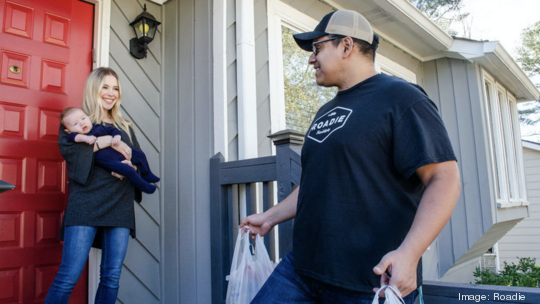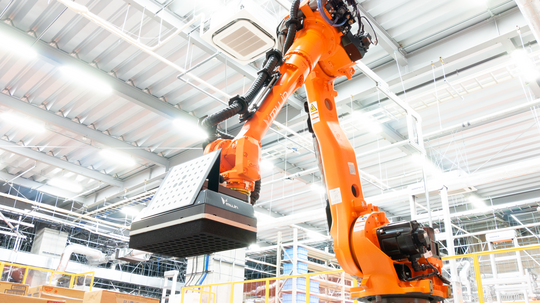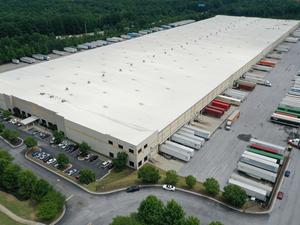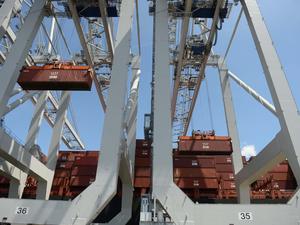
The 2021 holiday season has become synonymous with supply chain disruptions.
Demand for e-commerce rose during the COVID-19 pandemic, but labor shortages within the supply chain created strains for delivery and processing, said Sid Mookerji, managing partner of Atlanta-based Silicon Road Ventures, which invests in commerce innovations.
Mookerji sees the delays continuing into the next year as the industry adapts to the changes in demand and workforce.
The short-term solution for retailers? Planning and early ordering, Atlanta supply chain technology leaders say. To alleviate disruptions in the long term, here are three innovations they say could make the industry more efficient.
Automation
Artificial intelligence and machine learning technologies could be solutions to the low employment in the industry, Mookerji said. That could mean adopting robotics systems within a fulfillment warehouse or autonomous truck fleets to deliver the goods.
“We have a timing issue here because the robots haven’t quite arrived yet,” said Tyler Scriven, CEO of warehousing startup Saltbox. “But maybe people leaving the industry will be the impetus to accelerate that effort.”

Saltbox, which has $16 million in investments, provides co-warehousing space for small businesses. As automation technology develops, Saltbox has a flexible workforce that could help e-commerce retailers with fulfillment needs during labor shortages.
Scriven plans to adopt automated fulfillment technology to help their small businesses have competitive delivery capabilities with big-box e-commerce retailers. One small business may not have the resources to implement that emerging technology but bringing 50 businesses into a Saltbox space makes it possible, Scriven said.
While autonomous technologies haven’t become mainstream yet, Atlanta is home to a growing number of companies in this space.
Robotics supply chain companies Exotec and Mujin Corp. both opened their U.S. headquarters in Atlanta earlier this year. Online fashion retailer ASOS Plc is investing $150 million to automate its metro Atlanta distribution facility. The city of Peachtree Corners’ Curiosity Lab acts as a test bed for autonomous vehicles and other transportation innovations.

Merchandise close to customers
Reducing the distance merchandise must travel to reach the customer could alleviate delivery delays.
That could mean more domestic manufacturing or more warehouse spaces for inventory, Mookerji and Scriven said.
Mookerji pointed to Softwear Automation, an Atlanta startup that automates the manufacturing of sewn goods, as an example. The startup spun out of research from the Georgia Institute of Technology and could help bring more manufacturing into the state. Automation is a huge part of increasing domestic production, Mookerji said.
Officials at Georgia Tech agree. The university and partner organizations are in the running for a federal grant of up to $100 million that could transform the state into an AI manufacturing tech corridor — bolstering the manufacturing industry through the focus on innovation.
E-commerce retailers can also store their inventory in a variety of warehouse spaces, Scriven said, including massive warehouses in less populated areas and smaller ones in metro areas.
“It reflects the fact that you and I want to be able to have everything instantaneously,” Scriven said. “You need a lot more micro-warehouses.”

Delivery options
When the merchandise is closer to customers, delivery startups can help retailers move their products, said Marc Gorlin, CEO of logistics startup Roadie.
Roadie, which was acquired by United Parcel Service (NYSE: UPS), uses gig workers to finish the last mile of distribution networks. Gopuff, a Philadelphia-based startup that operates in Atlanta, also uses gig workers to deliver foods and consumer goods in as little as 30 minutes, according to its website.
Retailers have also started implementing tiered delivery times, which help them know which items to prioritize, Gorlin said. If a customer needs the item the next day, they may pay extra for that shipping. But if the order isn’t urgent, they could save money by waiting, he said.
“The major lesson from last year’s peak season is that smart retailers are going to create a menu of shopping methods for their customers,” Gorlin said. “Lots of optionality.”







